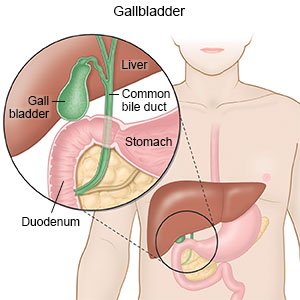ERCP (Endoscopic Retrograde Cholangiopancreatography)
Medically reviewed by Drugs.com. Last updated on Aug 4, 2025.
Endoscopic retrograde cholangiopancreatography (ERCP) is a procedure to examine the ducts of your pancreas or gallbladder. ERCP may also be used to open blocked ducts, or to diagnose problems with your pancreas or gallbladder. An endoscope (thin, flexible tube with a light) will be used for the procedure.
 |
DISCHARGE INSTRUCTIONS:
Call your doctor if:
- You have sudden, severe abdominal pain.
- You have problems swallowing.
- Your heart beats faster than normal for you.
- You have black, sticky bowel movements.
- You feel weak, lightheaded, or faint.
- You have a fever and chills.
- You have nausea or are vomiting.
- Your abdomen is bloated or feels full and hard.
- You have abdominal pain.
- You lose your appetite, your skin feels itchy, and your skin turns yellow.
- You have questions or concerns about your procedure.
Related medications
Self-care:
- Rest when you feel it is needed. You may be drowsy for up to 24 hours after your procedure. Return to your daily activities as directed.
- Ask when you can eat regular foods. Healthy foods include fruits, vegetables, whole-grain breads, low-fat dairy products, beans, lean meats, and fish.
- Relieve a sore throat with ice chips, liquids, or lozenges as directed.
- Do not take aspirin after your procedure unless your healthcare provider says it is okay. Aspirin may increase your risk for bleeding.
Follow up with your doctor as directed:
Write down your questions so you remember to ask them during your visits.
© Copyright Merative 2025 Information is for End User's use only and may not be sold, redistributed or otherwise used for commercial purposes.
The above information is an educational aid only. It is not intended as medical advice for individual conditions or treatments. Talk to your doctor, nurse or pharmacist before following any medical regimen to see if it is safe and effective for you.
Further information
Always consult your healthcare provider to ensure the information displayed on this page applies to your personal circumstances.
